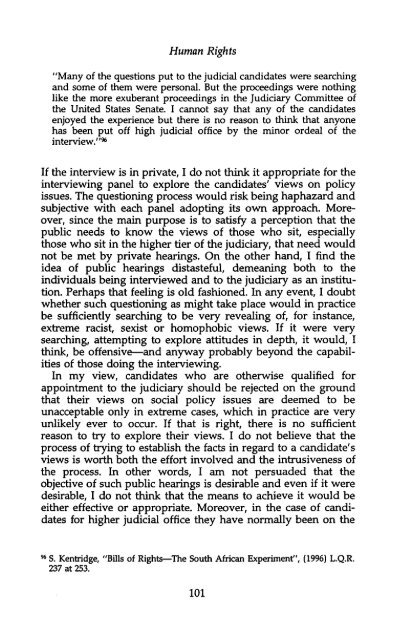HAMLYN - College of Social Sciences and International Studies ...
HAMLYN - College of Social Sciences and International Studies ...
HAMLYN - College of Social Sciences and International Studies ...
You also want an ePaper? Increase the reach of your titles
YUMPU automatically turns print PDFs into web optimized ePapers that Google loves.
Human Rights<br />
"Many <strong>of</strong> the questions put to the judicial c<strong>and</strong>idates were searching<br />
<strong>and</strong> some <strong>of</strong> them were personal. But the proceedings were nothing<br />
like the more exuberant proceedings in the Judiciary Committee <strong>of</strong><br />
the United States Senate. I cannot say that any <strong>of</strong> the c<strong>and</strong>idates<br />
enjoyed the experience but there is no reason to think that anyone<br />
has been put <strong>of</strong>f high judicial <strong>of</strong>fice by the minor ordeal <strong>of</strong> the<br />
interview." 96<br />
If the interview is in private, I do not think it appropriate for the<br />
interviewing panel to explore the c<strong>and</strong>idates' views on policy<br />
issues. The questioning process would risk being haphazard <strong>and</strong><br />
subjective with each panel adopting its own approach. Moreover,<br />
since the main purpose is to satisfy a perception that the<br />
public needs to know the views <strong>of</strong> those who sit, especially<br />
those who sit in the higher tier <strong>of</strong> the judiciary, that need would<br />
not be met by private hearings. On the other h<strong>and</strong>, I find the<br />
idea <strong>of</strong> public hearings distasteful, demeaning both to the<br />
individuals being interviewed <strong>and</strong> to the judiciary as an institution.<br />
Perhaps that feeling is old fashioned. In any event, I doubt<br />
whether such questioning as might take place would in practice<br />
be sufficiently searching to be very revealing <strong>of</strong>, for instance,<br />
extreme racist, sexist or homophobic views. If it were very<br />
searching, attempting to explore attitudes in depth, it would, I<br />
think, be <strong>of</strong>fensive—<strong>and</strong> anyway probably beyond the capabilities<br />
<strong>of</strong> those doing the interviewing.<br />
In my view, c<strong>and</strong>idates who are otherwise qualified for<br />
appointment to the judiciary should be rejected on the ground<br />
that their views on social policy issues are deemed to be<br />
unacceptable only in extreme cases, which in practice are very<br />
unlikely ever to occur. If that is right, there is no sufficient<br />
reason to try to explore their views. I do not believe that the<br />
process <strong>of</strong> trying to establish the facts in regard to a c<strong>and</strong>idate's<br />
views is worth both the effort involved <strong>and</strong> the intrusiveness <strong>of</strong><br />
the process. In other words, I am not persuaded that the<br />
objective <strong>of</strong> such public hearings is desirable <strong>and</strong> even if it were<br />
desirable, I do not think that the means to achieve it would be<br />
either effective or appropriate. Moreover, in the case <strong>of</strong> c<strong>and</strong>idates<br />
for higher judicial <strong>of</strong>fice they have normally been on the<br />
96 S. Kentridge, "Bills <strong>of</strong> Rights—The South African Experiment", (1996) L.Q.R.<br />
237 at 253.<br />
101

















